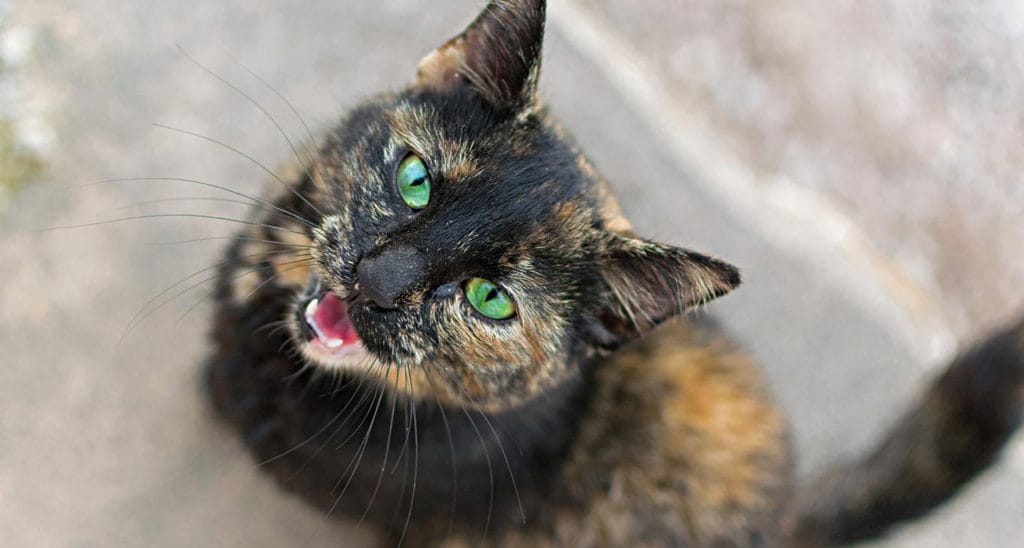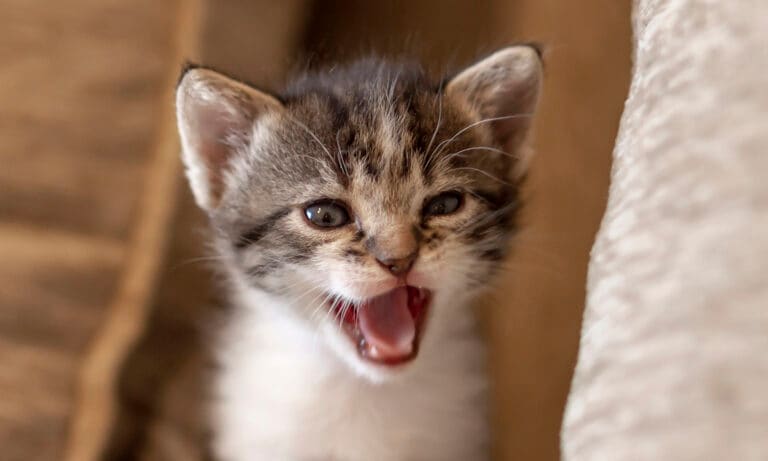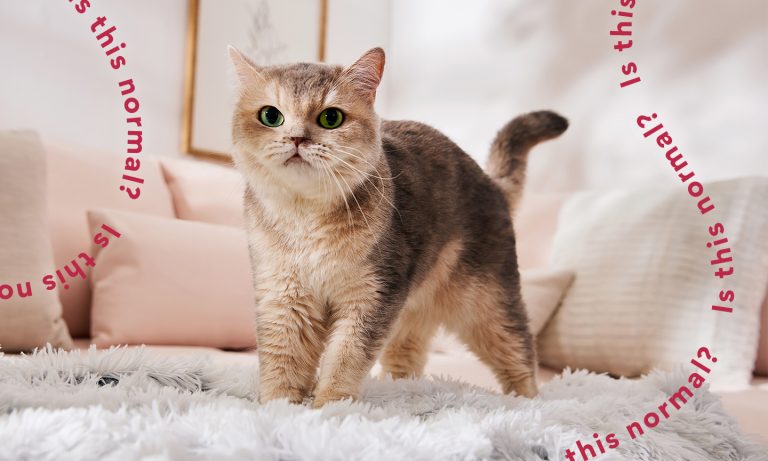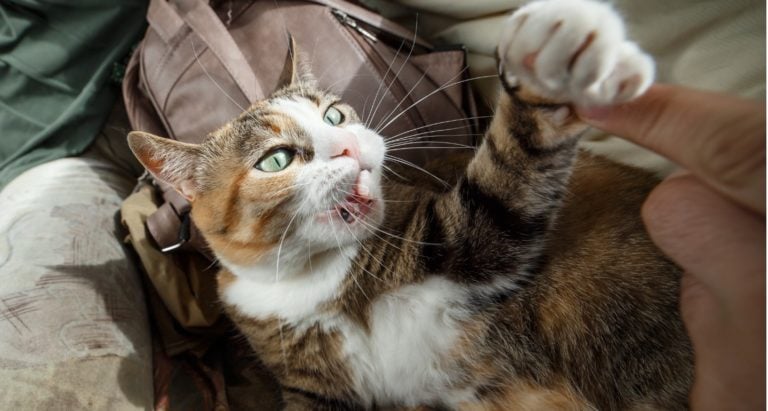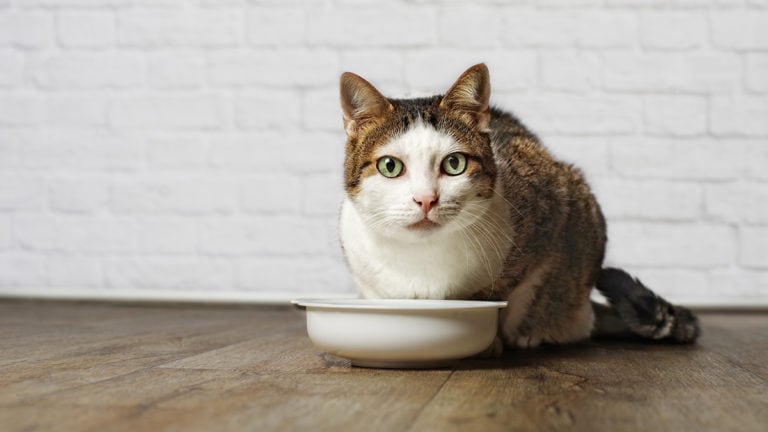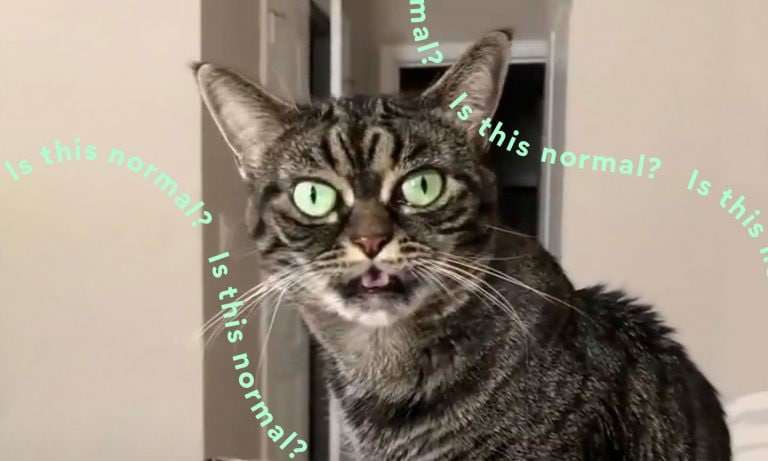Part of the appeal of cats is they are rather quiet pets in general. However, cats have evolved a multitude of specific vocalizations to communicate with humans, from soft “I missed you” chirrups to “feed me NOW” demanding yowls. But when a cat meows at high volume, it can be anything from a call for attention to a cry for help. So, how do you know why your cat’s meowing loudly?
Any time you find yourself thinking, my cat meows a lot more than usual or my cat’s meows have gotten a lot louder lately, further investigation is warranted. There are many reasons a cat might be meowing loudly or meowing a lot, from illness to loneliness to hunger.
Illness
Cats are masters at hiding the fact that they are sick. It’s an instinct left over from the days before cats were domesticated. (In the wild, a sick animal is an easy target for predators.) However, cats might start meowing loudly or meow a lot more when something is not right medically. If your cat suddenly starts meowing excessively, check for other signs that they might be sick.
“Look for changes in appetite, activity level and litter box eliminations,” says Aimee Simpson, VMD, medical director of the VCA Cat Hospital of Philadelphia in Pennsylvania. “These may be increased or decreased, but any change is important. Gastrointestinal issues (vomiting and diarrhea) also accompany many illnesses.”
Some common illness-related issues that might cause a cat to meow loudly or meow a lot include:
Discomfort
“The most concerning vocalization for cats is when it occurs during urination,” Dr. Simpson says. “This can signal a urethral obstruction making urination difficult or even impossible. This condition becomes quickly fatal so any cat straining to urinate is an emergency!”
High blood pressure
“Senior cats (over 7 years old) should have their blood pressure checked at their semi-annual wellness exams,” Dr. Simpson says. “Untreated hypertension can lead to retinal detachment and blindness in cats.”
Hyperthyroidism
According to Dr. Simpson, a hyperthyroid cat might also show increased appetite while losing weight, increased thirst and urination, vomiting, and increased activity. “Senior cats should have their thyroid hormone level tested at least once a year,” she says.
Seeking Attention/Loneliness
Some cats begin meowing loudly or persistently when they are feeling bored or lonely. But before you assume your cat is just being extra needy, seek counsel from your vet.
“Attention-seeking behaviors can be difficult to discern from illness, so it's best to rule out a medical cause first,” Dr. Simpson says.
If your cat gets a clean bill of health from your veterinarian, think about the times when your cat’s meowing loudly or when you notice your cat meows a lot. Is the meowing occurring after your long absence (for instance, after you’ve been at work all day or a after a busy weekend with much time spent away from home)? Dr. Simpson says that although many cats are content to live without another animal companion, some cats might exhibit loneliness after the loss of animal or human companion.
“This could present itself as visiting places that the other animal/human often inhabited (for example, a bed or favorite chair),” she says. “Calming pheromones like Feliway [Plug-In Diffuser] or stress-relieving treats like [Nutramax] Solliquin [Calming Soft Chews] may help with this type of behavior, as well as attention-seeking behavior.”
4
Stress
Cats who are experiencing stress or anxiety might meow loudly or meow a lot. And cats are especially prone to feeling stressed and anxious, Dr. Simpson says.
“This usually comes from a lack of something in their environment,” Dr. Simpson says. “[Provide] toys—especially “prey” type toys—and activities to keep them engaged, [as well as] hiding spots and areas to scratch.”
According to Dr. Simpson, other signs of stress or anxiety in cats include inappropriate urination, over-grooming and aggression toward other pets or people.
If you suspect your indoor cat might be stressed, consider environmental enrichment. Add more climbing and hiding places, such as cat trees, cat tents and perching spots near windows. Provide interesting toys and include more playtime with interactive toys like feather wands. Also, be sure to keep the litter box extra clean, scooping it at least twice a day.
Learn more about the signs of stress in cats and how you can help.
5
Aging
Cats suffering from dementia might meow loudly or excessively.
“Cognitive dysfunction syndrome (CDS) in cats is similar to cognitive dysfunction in dogs and Alzheimer’s disease in humans,” Dr. Simpson says. “Senior cats over 10 years old are most commonly affected.”
According to Dr. Simpson, signs of cognitive dysfunction syndrome in cats include:
- Disorientation (aimless wandering)
- Altered social interactions (changes in mood or temperament)
- Changes in sleep-wake cycle (awake at night, night vocalization)
- House soiling
- Changes in activity level
- Difficulty adjusting to new things
- Difficulty learning or remembering
If your senior cat is older than 10 and recently started meowing loudly or meowing a lot, visit your veterinarian to have your cat examined.
“Cognitive dysfunction syndrome is a diagnosis of exclusion, so other illnesses, like hyperthyroidism, should be ruled out first,” Dr. Simpson says. “There is no approved treatment for CDS in cats, but options include extra-label use of Anipryl (which is FDA-approved in dogs), SAM-e and anti-anxiety medications (SSRIs), as well as environmental enrichment.”
Mating Calls
If you’ve ever heard the loud and distinctive vocalizations of cats mating, it’s a sound you likely won’t forget.
“Female cats in heat commonly writhe on the floor or display lordosis (chest on the ground with hindquarters up),” Dr. Simpson says. “Cats become sexually mature at a young age (usually around 6 months old) so it’s important to have them spayed/neutered when this occurs.”
Learn more about your cat's behavior
Share:
